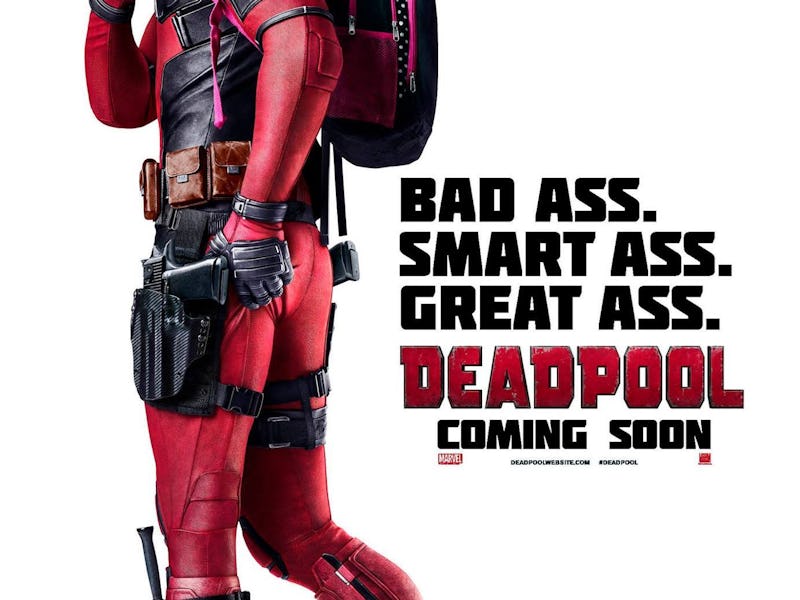What the Huge Box Office Success of 'Deadpool' Says About Hollywood
Future superhero movies are going to pore over this unlikely smash hit.

This weekend, Deadpool came, he saw, he conquered. The “Merc With a Mouth” opened with an astonishing $150 million over the three day President’s Day weekend, making a lot of critics, fans, and industry analysts rethink everything they know about superhero movies. How did an R-rated, semi-obscure Marvel character owned by Fox manage to go from an underdog to a full-fledged phenomenon overnight? Is Deadpool a fortunate outlier that managed to squeak by during a February box office lull, or will the purely out-of-left-field hit signal a shift in the overcrowded superhero genre?
Here are some lessons to learn from Deadpool going forward.
5. The summer movie season could begin in February.
The primary season to open huge blockbusters has steadily grown since June through August became the de facto window for studios to release their annual tentpole franchises. Now the summer movie season is generally accepted to be the first Friday in May straight through to Labor Day weekend, and studios take full advantage of their time by strategically planting the flag of a Marvel movie or a Transformers movie therein. It seems like the rest of the year is just a movie dumping ground or reserved for prestige pictures gunning for award season clout.
Deadpool opened in February because it was a low risk, and it looks like it paid off. But the sheer numbers surrounding its President’s Day weekend success means that summer movie season could be stretched this early in the year. Couple that with the recent enormous box office push in China in February and it seems like we can put an end to emphasizing the importance of the summer movie season. People are going to fork over their cash at any point during the year.
4. The major X-Men spin-offs are probably dead.
Among the individual superhero characters, it’s safe to say that even a large majority of the moviegoing public is at least aware of the angsty, multi-clawed mutant with a bad perm named Wolverine. He’s a cornerstone of Fox’s X-Men franchise. Did those same people know who Deadpool was before the movie marketing kicked into gear? Probably not. So ponder this for a second: Deadpool made more money in its opening weekend domestically than The Wolverine did in its entire theatrical run.
This probably means studios like Fox will shy from expanding their superhero universe movies starring main characters. Why spend $150 million on a Cyclops or Storm standalone when you could throw $50 million at niche fan-fave characters for potentially larger gains? It’s a worthwhile gamble that put money in the bank while winning over the fans who will keep coming back for more.
3. Unorthodox marketing can work.
The weird ads for Deadpool were everywhere, but they managed to pull off the ticklish task of not being boring. Fox nailed the marketing campaign by flooding the idea of Deadpool while still injecting enough WTF moments to make it interesting. All the posters and mini-teasers were fun and unusual, and funny in ways that didn’t overwhelm people who had no idea who the Merc With a Mouth was. They were entertaining in the same way the movie was entertaining: self-deprecating and slyly conspiratorial. If you’re going to keep releasing endless poster variants or cryptic teasers for your movie you might as well make people give a shit about them.
2. Ditch grit.
Here’s a headline you should anticipate seeing sometime soon: “2016: The Year the Dark and Gritty Superhero Movie Died.” Christopher Nolan’s Batman movies still loom over the genre, having brought Oscar-level credibility and billion-dollar returns.
But not every superhero story needs to be a grim, stately slog. Look at Man of Steel — its moody, broody tone didn’t serve its underlying story, and audiences didn’t care for watching Superman pummel a major city into gravel. How else to explain a development that feels like superhero heresy: Deadpool’s opening weekend outpaced Man of Steel’s opening weekend. It’s perhaps no surprise that these movies can make a buttload of money if you make them seem fun to watch, kind of like how the Marvel Cinematic Universe has been doing things for a decade. Levity and having a grasp on the right tone is key, which will most likely make Batman v. Superman a chore.
1. A particular kind of fan service pays off.
Deadpool owes it all to the fans, obviously. But there’s a rub. If fans demand a literal transposition of the source material from the page to the screen, the world gets a dour and dysfunctional mess like Watchmen (sorry, but Zack Snyder just can’t catch a break). If you stray too far away from what made the source material into a phenomenon, you get a goopy blob like last summer’s atrocious Fantastic Four reboot.
Deadpool threaded the needle. It embraces the source material, but it isn’t an adaptation of any one comic book story. It realizes that movies and comics are separate mediums with their own unique strengths and weaknesses, but the movie still doesn’t forget to distinguish itself as Deadpool. The costume is there, the fourth-wall-breaking comedy is there, and the energy is there from the page the the screen. Until now, the Fox’s Marvel movies haven’t realized this. It’s what makes X-Men movies mostly a blockbuster movie mush despite casting charismatic performers (Jennifer Lawrence, Michael Fassbender, James McAvoy, and now Oscar Isaac) as iconic superheroes. Fan service is important, but you need to know when to dial it back to make your movie work. Deadpool may have one too many dick jokes, but at least it gets its winking nods to the fans dead on.